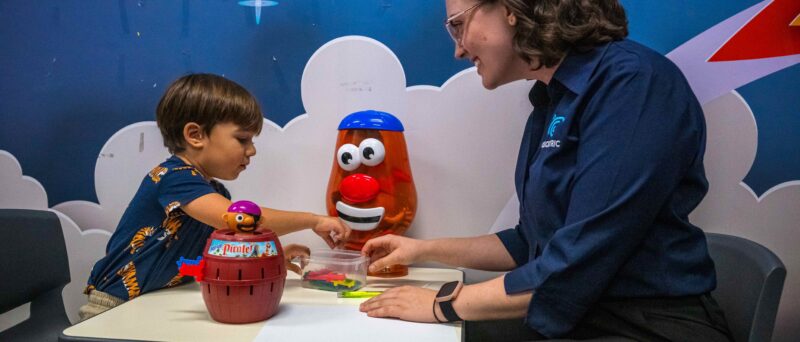A speech pathologist can provide significant assistance and support to individuals with dysphagia, a condition characterised by difficulty in swallowing. Here’s how they can help:
Assessment and Diagnosis
Comprehensive Evaluation: The speech pathologist will conduct a thorough assessment to understand the nature and severity of the swallowing problem. This may include clinical swallowing evaluations and instrumental assessments like a Modified Barium Swallow Study (MBSS) or a Fibreoptic Endoscopic Evaluation of Swallowing (FEES).
Identifying the Cause: Understanding whether the dysphagia is due to neurological, structural, or other causes is crucial for developing an effective treatment plan.
Developing a Treatment Plan
Individualised Plan: Based on the assessment, the speech pathologist will create a tailored treatment plan addressing the specific needs and challenges of the patient.
Exercises: Implementing exercises to strengthen the muscles involved in swallowing. This may include oral-motor exercises, pharyngeal strengthening exercises, and techniques to improve coordination.
Techniques and Strategies: Teaching safe swallowing techniques, such as altering the head or body position during eating, modifying the consistency of food and liquids, and employing specific manoeuvres (e.g., the supraglottic swallow or Mendelsohn manoeuvre).
Dietary Modifications
Texture Modification: Recommending changes to food and drink textures to make swallowing safer and easier. This can range from pureed foods to thickened liquids.
Nutritional Support: Collaborating with dietitians to ensure the patient maintains adequate nutrition and hydration while adhering to swallowing safety recommendations.
Education and Training
Patient and Family Education: Providing education to the patient and their family about dysphagia, including its risks, management strategies, and the importance of following recommendations.
Caregiver Training: Training caregivers or support networks on how to prepare appropriate meals, assist during meals, and recognize signs of swallowing difficulties or aspiration (food or liquid entering the airway).
Adaptive Equipment
Recommending Tools: Suggesting and training patients in the use of adaptive equipment, such as specialised cups, straws, or utensils that can facilitate safer swallowing.
Monitoring and Adjusting Treatment
Regular Follow-ups: Conducting follow-up assessments to monitor progress, adjust treatment plans, and address any new or ongoing issues.
Collaboration with Other Professionals: Working closely with other healthcare providers, including doctors, dietitians, physiotherapists, and occupational therapists, to ensure comprehensive care for the patient.
By addressing both the physiological and functional aspects of swallowing, a speech pathologist can significantly improve the quality of life for individuals with dysphagia, helping them eat and drink more safely and comfortably.
At Concentric, our speech pathologists work closely with other members of our allied health teams as part of a multidisciplinary approach to supporting clients and their families. We work together with NDIS participants as well as private clients to assist them in achieving their treatment goals.
If you would like to find out more about how our speech pathologists can work with you or your loved one, please contact us at 1300 148 160 or email support@concentric.com.au.


